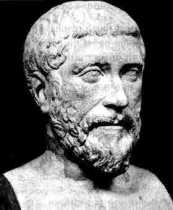
Pythagoras of Samos

Born: about 569 BC in Samos, Ionia
Died: about 475 BC
None of his writing have survived, and little is known of his
mathematical accomplishments. However, it is believed that he led a
half-religious/half-scientific society that followed a strict code of secrecy (followers
were called mathematikoi). Pythagoras believed in reincarnation and was thus a
vegetarian. Seemingly a well educated man (by philosophers such as Thales who
instilled an interest in mathematics in him), Pythagoras traveled throughout
southern Europe between the ages of 20 and 50, where his stop in Egypt made a
lasting impression on him. After his travels, he "settled" in Italy where he
established the world's first university: a philosophical and religious school
in Croton(e). This was his Society of which both men and women could
participate in the search for principles of mathematics, in the exploration of
the concepts of "number" and "triangle" or other mathematical figures, and in
the discussion of the abstract idea of a proof. Some mathematical contributions
include his work in even and odd numbers, the idea that the square root of 2 is
irrational, and his astronomic and geometric theorems, including the famous
Pythagorean Theorem of a right triangle (a^2 + b^2 = c^2).
You can find more about Pythagoras
here.
Page created and maintained by Jorge Cunha